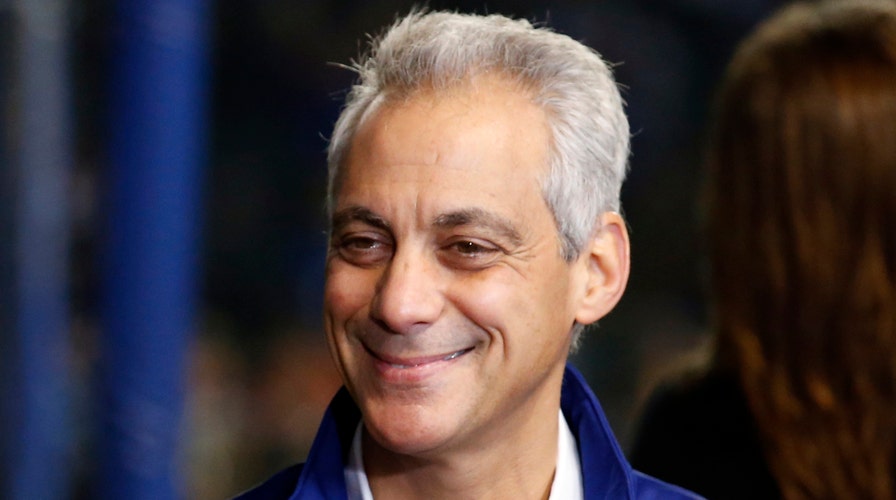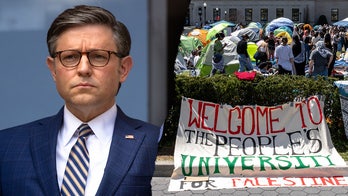Sanctuary cities dig in for fight with Trump administration
Chicago Mayor Rahm Emanuel sends message to president-elect
Democratic mayors in so-called "sanctuary cities" are poised for a major clash with President-elect Donald Trump as city officials from Los Angeles to Washington vow not to cooperate with his administration on deportation orders for illegal immigrants.
Trump's election has spurred mayors and police chiefs in nearly a dozen major cities to re-affirm their "sanctuary" status, putting them in direct conflict with Trump's immigration enforcement push -- and effectively daring him to slash sanctuary-city funding as he promised during the campaign.
“To all those who are, after Tuesday’s election, very nervous and filled with anxiety as we’ve spoken to, you are safe in Chicago, you are secure in Chicago and you are supported in Chicago,” Mayor Rahm Emanuel said during a press conference. “Chicago will always be a sanctuary city.”
Emanuel joined officials in New York; Seattle; Boston; San Francisco; Los Angeles; Oakland, Calif.; Providence, R.I.; Santa Fe, N.M.; Denver; and Washington, D.C., in saying they will maintain their sanctuary status.
Emanuel also shrugged off Trump’s call to cut funding.
"I would say to the president-elect, that the idea that you’re going to penalize Boston, New York, Los Angeles, Chicago, San Francisco, Philadelphia -- these are the economic, cultural and intellectual energy of this country," Emanuel said in a radio interview.
COTTON: TRUMP, CONGRESS NEED TO REDUCE IMMIGRATION
New York Mayor Bill de Blasio said last week he would go so far as to destroy a database of undocumented immigrants with city identification cards before handing it over to the Trump administration.
“We are not going to sacrifice a half-million people who live amongst us,” de Blasio said. “We will do everything we know how to do to resist that.”
In sanctuary cities, local law enforcement officials aren’t required to contact U.S. Immigration and Customs Enforcement about the immigration status of people they come in contact with. That can mean, for example, that they don't notify the feds when an undocumented immigrant is about to be released from custody.
Sanctuary cities can also bar their employees, including police, from asking about a person's immigration status because crime victims and witnesses might be less likely to talk to investigators if they are worried about being deported.
Trump said in a recent "60 Minutes" interview that he plans to deport 2 million to 3 million undocumented immigrants who have a criminal history. He’s also said he could create a special deportation task force within ICE, though sanctuary city resistance could complicate their efforts.
"Sanctuary" policies surged back into the national spotlight last year after the shooting death of Kathryn Steinle by an undocumented immigrant in San Francisco. The shooter had been released from a county jail even though federal officials had asked him to be held until they could take custody.
Critics of sanctuary cities argue the policies harbor criminals and endanger public welfare.
“President-elect Trump is talking about a very focused effort to get rid of people who are criminals,” former House Speaker Newt Gingrich told Fox News' "The O'Reilly Factor." “You’d think that the mayor of Chicago, in the middle of the worst murder pattern in the city’s history, would be thrilled to have somebody help him get rid of criminals.”
But Los Angeles Police Chief Charlie Beck calls Trump’s plan to deport illegal immigrants misguided and impractical.
“I need them to work with their local police stations, I need them to be witnesses to violent crime,” Beck said. “For a local law enforcement agency to take on [the] role of immigration enforcement tears that fabric apart.”
Because states and cities can't be required to enforce federal law — and there's no U.S. requirement that police ask about a person's immigration status — one of the only options Trump and the Republican-controlled Congress have is to pull funding.
During a September campaign stop in Phoenix, Trump said, “Cities that refuse to cooperate with federal authorities will not receive taxpayer dollars” and pledged his administration would “work with Congress to pass legislation to protect those jurisdictions that do assist federal authorities.”
Trump’s ability to cut off federal funding rests primarily with Congress. In the past, congressional Republicans have tried -- and failed -- to use federal funds as leverage.
Last year, Democrats in the Senate blocked a bill by Republican Sen. David Vitter that would have stripped some federal funding from cities that shield undocumented workers from federal immigration officials.
Vitter, who is retiring from the Senate, tweeted Tuesday: “#SanctuaryCities are illegal, dangerous. Obvious 1st step: Withhold fed funding for cities ignoring immigration law.”
Big GOP wins in the House and Senate on Election Day have some like Dan Stein, president of the Federation for American Immigration Reform, optimistic there is momentum for change.
“This is one of [Trump’s] marquee campaign promises and it’s got strong Republican support,” Stein said. “It’s very likely we’ll see legislative action early on.”
Rep. Vern Buchanan, R-Fla., is pushing for Congress to quickly pass two bills tied to sanctuary cities -- Kate’s Law, which would toughen penalties against anyone who re-enters the country after being deported, and the Stop Dangerous Sanctuary Cities Act, which would cut federal funding to any city that refuses to enforce immigration laws.
“Taxpayers should not be supporting cities that ignore federal law,” Buchanan said in a written statement. “While we are a nation of immigrants, we are also a nation of laws. Our No. 1 priority should be targeting criminals that are here illegally.”
Despite the show of support from some GOP lawmakers, it’s still unclear what money Trump might actually pull from the cities.
The Supreme Court has held that for Congress to impose conditions on the receipt of federal money by the states, the conditions must be reasonably related to the purpose of the money. For example, the feds threatened to withhold highway funds from any state that failed to adopt a 0.08 blood-alcohol limit: Both the limit and the highway funding were related to road safety.
Still, the Justice Department’s inspector general looked at some jurisdictions with sanctuary policies earlier this year and concluded some appear to violate a federal law that says state and local governments may not prohibit or restrict officials from sharing information about a person’s immigration status with federal immigration officials. Having such policies could jeopardize millions of dollars in DOJ grant money the jurisdictions receive, the IG memo said.
Fox News' Barnini Chakraborty, Jonathan Hunt and The Associated Press contributed to this report.





